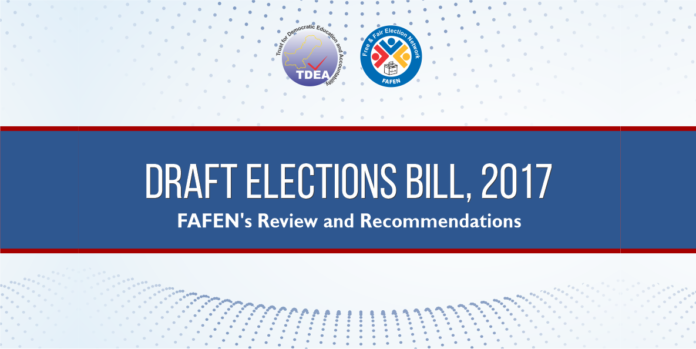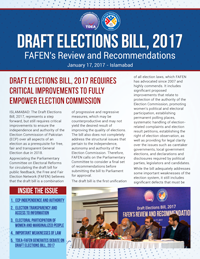The Draft Elections Bill, 2017, represents a step forward, but still requires critical improvements to ensure the independence and authority of the Election Commission of Pakistan (ECP) over all aspects of an election as a prerequisite for free, fair and transparent General Election due in 2018.
Appreciating the Parliamentary Committee on Electoral Reforms for circulating the draft bill for public feedback, the Free and Fair Election Network (FAFEN) believes that the draft bill is a combination of progressive and regressive measures, which may be counterproductive and may not yield the desired result of improving the quality of elections. The bill also does not completely address the structural issues that pertain to the independence, autonomy and authority of the Election Commission. Therefore, FAFEN calls on the Parliamentary Committee to consider a final set of recommendations before submitting the bill to Parliament for approval.
The draft bill is the first unification of all election laws, which FAFEN has advocated since 2007 and highly commends. It includes significant proposed improvements that relate to protection of the authority of the Election Commission, promoting women’s political and electoral participation, establishing permanent polling places, systematic handling of election-related complaints and election result petitions, establishing the right of election observation, as well as providing for legal clarity over the issues such as caretaker governments, local government elections, and declarations and disclosures required by political parties, legislators and candidates.
While the bill adequately addresses some important weaknesses of the election system, it still includes significant defects that must be remedied. Perhaps most importantly, the proposed law does not go far enough in protecting the independence and authority of the Election Commission with regard to the promulgation of procedural rules to administer elections and disqualifying Members who violate rules. The Commission also is not given full control over Returning Officers and have responsibility for critically-important steps in the election process, including candidate nominations and constituency election results.
In addition, the bill improves election transparency in some respects, but punishes anyone who shares election information outside the chain of command, bars media and observers from the scrutiny of candidate nominations, and fails to provide time standards for publication of the most essential election-related documents and data. The election bill includes several positive measures related to women’s participation, but misses the opportunity to establish a legal procedure for collecting sex-disaggregated voting data or take initiatives on behalf of the electoral rights of other marginalized communities, including religious minorities. There is still an opportunity for the parliamentary committee to cure these debilitating infirmities in the draft election bill, 2017.
To download complete report, click here




